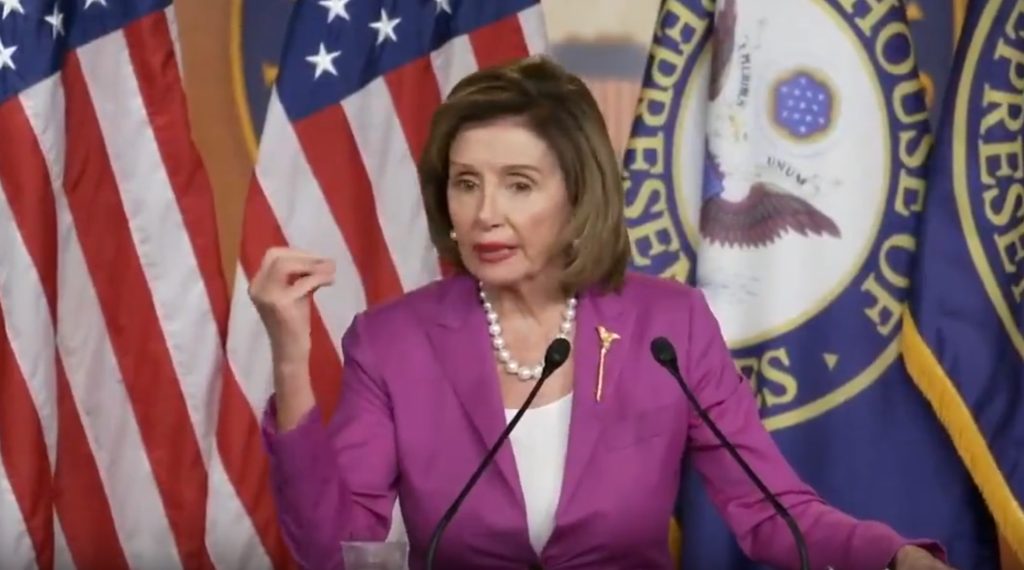Chief Justice John Roberts cited former House Speaker Nancy Pelosi in his stinging majority opinion against President Biden’s student loan forgiveness plan.
Roberts released the Supreme Court’s opinion on Friday saying that Biden’s student loan forgiveness plan was unconstitutional, thereby depriving Biden of one of his significant campaign pledges.
In the opinion, Roberts used Pelosi’s words to illustrate that the President lacked the authority to cancel federal student loan debt.
“As then-Speaker of the House Nancy Pelosi clarified: ‘People think that the President of the United States has the power for debt forgiveness. He does not,’” Roberts quoted Pelosi. “‘He can postpone. He can delay. But he does not have that power. That has to be an act of Congress.’”
Pelosi made the statement at her July 28, 2021, press conference. Watch:
Roberts added, “Aside from reiterating its interpretation of the statute, the dissent offers little to rebut our conclusion that ‘indicators from our previous major questions cases are present’ here,” referring to Justice Amy Coney Barrett’s concurring opinion.
Meanwhile, President Biden has already announced a plan to go around the Supreme Court ruling. On Friday, he declared his intention to implement a separate student debt-relief initiative under the Higher Education Act of 1965.
“Today’s decision has closed one path. Now we’re going to pursue another,” Biden said from the White House. “We will use every tool at our disposal to get you the student debt relief you need and reach your dreams.”
Nina Turner, a self-described educator and activist, responded to Roberts’ citation of Pelosi as “unacceptable.”
Let’s just say that the radical left is not taking the Supreme Court ruling well. And throwing in a Pelosi citation is the cherry on top of the wedding cake.
The Court is dealing with several high-profile cases as summer approaches. In a separate case upholding the free speech rights of a Christian web designer, Associate Justice Neil Gorsuch harshly criticized Associate Justice Sonia Sotomayor’s dissent.
“It is difficult to read the dissent and conclude we are looking at the same case,” Gorsuch wrote in the 6-3 Supreme Court decision on Friday. That decision said web designer Lorie Smith was not legally required to design websites for gay marriages because doing so would violate her free speech rights and Christian beliefs, despite a Colorado law that bans discrimination based on s**ual orientation.
Gorsuch added that Sotomayor’s dissent “reimagines the facts” from “top to bottom” and does not respond to the fundamental question: “Can a State force someone who provides her own expressive services to abandon her conscience and speak its preferred message instead?”
“In some places, the dissent gets so turned around about the facts that it opens fire on its own position,” Gorsuch wrote. “For instance: While stressing that a Colorado company cannot refuse ‘the full and equal enjoyment of [its] services’ based on a customer’s protected status . . . the dissent assures us that a company selling creative services ‘to the public’ does have a right ‘to decide what messages to include or not to include . . .’ But if that is true, what are we even debating?”
The dissenting justices, Sotomayor, Elena Kagan, and Ketanji Brown Jackson, labeled the ruling as a “blank check for discrimination,” expressing concern about its potential to implicitly assign gays and lesbians to an inferior status.
Sotomayor asserted, “The unsettling takeaway from the majority’s opinion is this: What’s mine is mine, and what’s yours is yours. Yet, the history of public accommodations laws tells a different story. In a free and democratic society, social stratification has no place.”
The case, 303 Creative LLC v. Elenis, captured the nation’s attention because it presented a clash between the First Amendment right to free speech and the principle of non-discrimination towards LGBTQ people.

